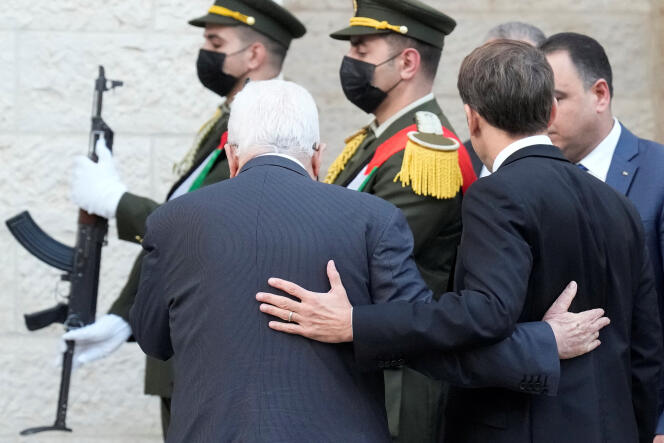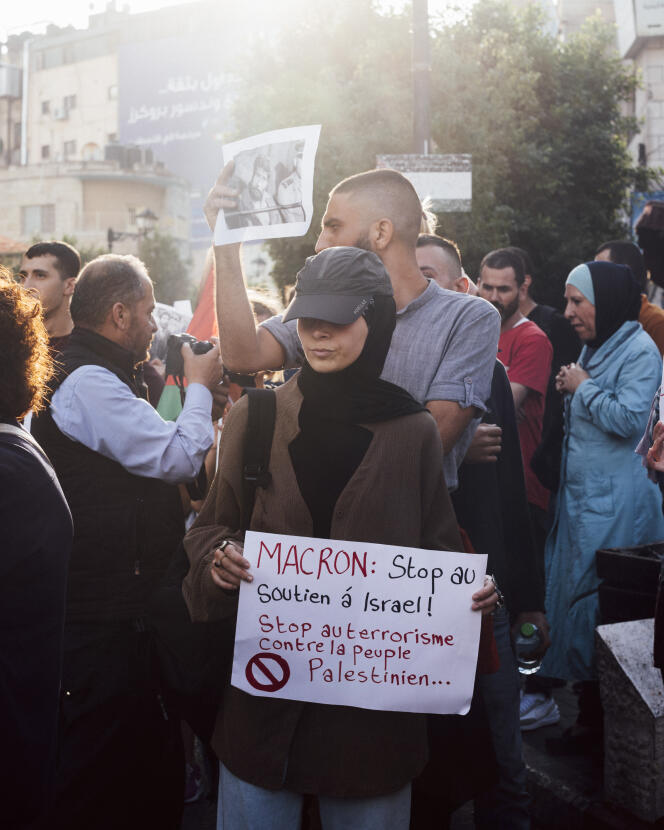


After his talks in Jerusalem, Emmanuel Macron left under heavy guard for Ramallah on Tuesday, October 24, to bring his support to Mahmoud Abbas, who appears weaker than ever by the war between Israel and Hamas. This highly secure trip – with an armed soldier standing guard every 50 meters – marked a break with the policy of isolating the Palestinian Authority (PA) president that European leaders had de facto applied since the resumption of the conflict.
Of the heads of government and ministers from the European continent who preceded Macron in Israel, only Dutch Prime Minister Mark Rutte had visited Ramallah, on Monday. The others accepted Israel's ban, which deemed the "security conditions" in the occupied West Bank insufficient. French Foreign Minister Catherine Colonna had herself complied on October 15. She simply contacted her counterparts by telephone from the Jerusalem consulate.
In Ramallah, on Tuesday, demonstrators burned a portrait of Macron, whom they accused of giving unqualified support to Israel in the war. "Nothing can justify" the "suffering" of civilians in Gaza, declared the French president at the end of a tête-à-tête with Abbas that lasted over an hour. "The life of a civilian is worth the life of another civilian, whatever their nationality. A Palestinian life is worth a French life, which is worth an Israeli life," he added. "My thoughts go out to the wounded, to the families who have lost loved ones, to the civilians in Gaza today, who are living in a situation of great distress," stressed Macron, with Israeli bombings having claimed nearly 6,000 lives, according to the Health Ministry in the Hamas-administered enclave.
For his part, Abbas denounced the "savage attack by the Israeli war machine" and demanded a "ceasefire," which Macron refrained from calling for. The French president sees this request as unacceptable to Israel, which is preparing to launch a ground offensive against Hamas in Gaza. During the various talks he has held, he merely spoke of "humanitarian protection," which would enable aid to be delivered to the civilian population and hostages to be released. Abbas, meanwhile, is calling for "permanent corridors" for humanitarian aid to Gaza's civilians.

But, facing his archenemy Hamas, Abbas could be tempted to endorse Israel's stated objective: the destruction of its military and governing capabilities in the enclave. Despite its barbarity which many Palestinians minimize, ignore, or accept, the October 7 attack was seen in the West Bank as a historic success for the armed struggle waged by the Islamists. It could spell the end for Abbas, as Hamas takes over the legacy of the moribund Palestine Liberation Organization (PLO), over which he still presides at the age of 87.
You have 47.78% of this article left to read. The rest is for subscribers only.
